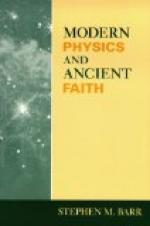1. That which comes through our senses, by observation and experience. This includes reasoning from relation.
2. That which comes through intuition—or, as some writers inaccurately say, “through the formal laws of thought.”
All the observation and experience of the rising and the setting of the sun for a thousand centuries could only have confirmed the first natural belief that it revolved daily around the earth; nor by joining this experience with other experiences could any deduction have come from our reason that would have opposed it. Not our reason but our intuition said that the sun stood still and the earth revolved daily. The oldest books in existence tell us that this axial revolution of the earth was not only known in the very dawn of time but that it has been known to every race (except our own of European savages) from before the time thought was first transmitted by writing.
Ask the ablest living geographer or physicist to prove to you that the earth revolves daily and he will reply that it would be the job of his life. It can be done at great expense and great labor, but that is because we know the answer and can invent a way of showing it, not because there are any observations from which a deduction would naturally follow.
Nearly if not all our great discoveries have come to us through intuition and not from observation and experience. When we know the lines on which to work, when intuition has given us the key, then the observation and experience men prize so highly, and the reason they worship so devoutly, will fill in the details. The knowledge that flows from observation and the reasoning from the facts it records, is never more than relatively true, it is always limited by the facts, and any addition to the facts requires the whole thing to be restated. We never know all the facts; seldom even the more important; and reason grasps only details.
Lamarck’s theory of evolution, known to all Asiatic races from time immemorial, was the intuitional and absolute knowledge that comes to all men when they reach a certain stage of development. Reason could never have furnished it from the facts, as Cuvier proved in the great debate in the French Academy in 1842, when he knocked Lamarck out, for the time being, because “it did not conform to the facts, and did not follow from any relation of the facts.”
Darwin’s theory of the survival of the fittest in the struggle for existence, as an explanation of the origin of species, was from observation and experience. It was based on observed facts. But Darwin was an evolutionist—a disciple of Lamarck. He held the Key. He used the Key. The value of Darwin’s work does not lie in his discovering that some bugs have been derived from other bugs and that the intermediate bugs have died off. Its overwhelming value to mankind was in showing that work on the theory of evolution was correct work and that the theory was true. When the intuition of man points out the way the reason of man can follow the path and macadam the road. It usually does and claims all the credit for itself as the original discoverer.




